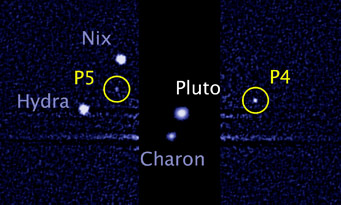Two of Pluto's moons have no names, but that's about to change. Planetary astronomer Mark Showalter announces a contest where you can help name the newest discoveries.
| Update (Feb. 25, 2013): Two clear winners stand out from the 450,234 votes collected: Vulcan and Cerberus. But the names aren't final yet. The formal approval process could take 1-2 months. Stay tuned. |

This image from the Hubble's Wide Field Camera 3 shows "P4" and "P5," Pluto's fourth and fifth known satellites.
M. Showalter & others / NASA / STScI
Over the centuries, the astronomical community has established standards for the naming of moons. Most names come from ancient mythologies. The moons of Uranus are the exception, with names coming primarily from the works of William Shakespeare.
These rules ensure that newly discovered moons receive names that have already stood the test of time. The same names will still be in use centuries and even millennia from now. Whereas today's literature might be long forgotten, we can be confident that future generations of astronomers (and maybe even astronauts) will still recall the stories from Mount Olympus and Stratford-upon-Avon.
I suspect these naming traditions did not arise by accident. For whatever reason, we humans seem to have a deep-seated, pre-scientific need to interpret the night sky in terms of stories. Naturally, we choose the big stories, involving grand themes, great powers and deep mysteries.
I've been involved in naming three moons: Pan at Saturn, plus Mab and Cupid at Uranus. In each case, the process was simple and straightforward. We pulled out our dusty old copies of Bullfinch's Mythology or the Riverside Shakespeare and started browsing. (In each case, I also experienced a wistful regret that I had not spent more time studying literature in college, back when I still had the opportunity.)
When we announced the discoveries of Pluto's fourth and fifth moons, it became clear to me that the naming process might have to be different. This time, I received hundreds of spontaneous, unsolicited suggestions. I suspect that some of the world's affection for Pluto comes from its so-called "demotion" to dwarf planet status. Perhaps it is also because the names of Pluto's moons are all associated with Hades and the Underworld, the stuff of so many of our most primal fears. Whatever the reason, the discovery team has decided that it would be unfair to keep the naming process to ourselves.
Starting today, we are trying something new. We are asking the public to help us name the moons. Visit plutorocks.seti.org and tell us what you think. We have seeded the ballot with a few names, or you can propose your own. The names will still have to be approved by the International Astronomical Union, but we will use your votes to help us decide the names we propose.
Please join us in adding the next chapter to the story of Pluto.
Mark Showalter is a senior research scientist at the SETI Institute in Mountain View, California. Most of his research focuses on the planetary rings and small moons of the outer planets.
 7
7
Comments
Trevor Coleman
February 13, 2013 at 5:58 am
Let's lighten it up and call them
Mickey
Minnie
Regrds,
Trevor
You must be logged in to post a comment.
Kurt
February 16, 2013 at 4:41 am
I would like to suggest that everyone vote to name one of these moons "Tyson" after Neil deGrasse Tyson. It would be a deserving tribute to a great man who has done much to promote science. Plus...It would be a humorous tribute too in that it would be a bit of sweet revenge to honor him like this given his efforts in supporting the demotion of Pluto from planet status. Imagine 100s of years from now people learning about Pluto and seeing all these names of the mythological underworld and then one moon named "Tyson". Justice is served. ...and a great man is remembered.
You must be logged in to post a comment.
atook
February 16, 2013 at 8:48 am
Lets save "Vulcan" for an exoplanet, not some silly little moon.
You must be logged in to post a comment.
Cate
February 16, 2013 at 10:52 am
I agree... I believe the "de-planet-ization" of Pluto is a new legend in the making. Tyson FEELS/SEEMS to fit the Greek/Roman theme... very similar to Tycho, after all!
You must be logged in to post a comment.
David Dickinson
February 16, 2013 at 11:28 am
By naming one of Pluto's moons Alecto, we'd honor Pluto discoverer Clyde Tombaugh with his initials "CT" contained in the name!
You must be logged in to post a comment.
Katie Young
February 23, 2013 at 9:52 am
Psyche and Persephone beautiful Greek legends.
You must be logged in to post a comment.
Barry M Warmkessel
February 24, 2013 at 12:29 am
The name Vulcan dates as far back as Madam Blavatsky (~1900) who said that it was 'The Forge Of The Avatars'. Christ and Buddha are just two such avatars and by this statement, she provided enough information to find it. It is a half Jovian mass body in a nominal 4969 year orbit.
Google: VULCAN REVEALED
It is A Dangerous New Jovian Sized Body In Our Solar System because it draws in Kuiper Belt objects and they become comet swarms threatening our inner solar system.
You must be logged in to post a comment.
You must be logged in to post a comment.